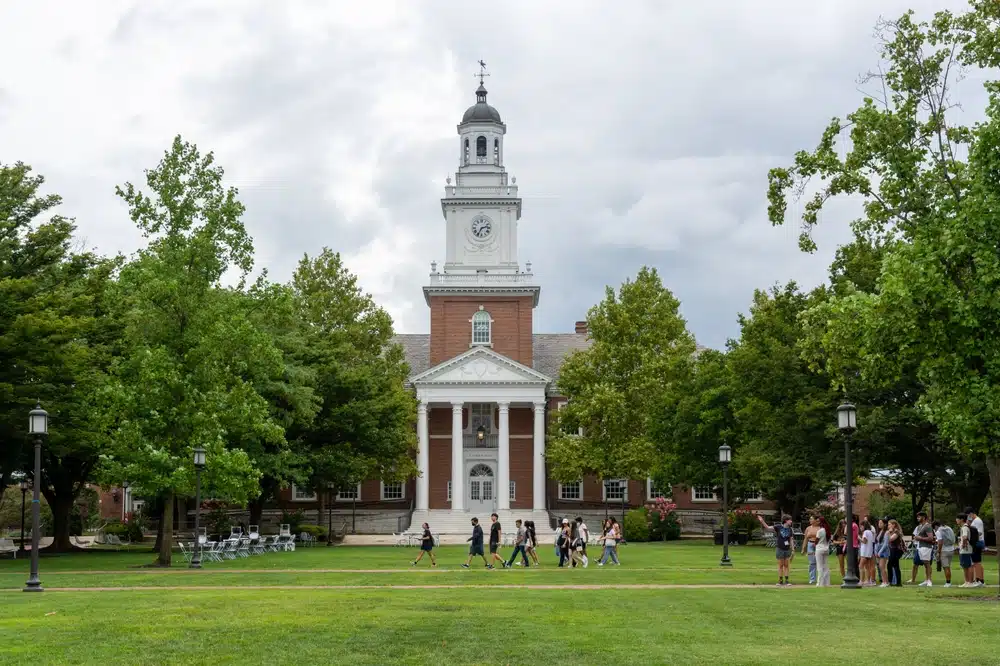Exploring the Johns Hopkins Curriculum
The Johns Hopkins University, one of the most prestigious universities worldwide, is renowned for its diverse and comprehensive curriculum. Delving into this complex system can be fascinating, as it opens windows to unlimited educational opportunities. This article explores the intricacies of the Johns Hopkins curriculum, shedding light on its underlying philosophy, structure, unique features, academic calendars, and student support resources.
Understanding the Johns Hopkins Education Philosophy
Understanding the Johns Hopkins education philosophy is essential, as it underscores the university’s commitment to providing a transformative educational experience that prepares students for a lifetime of success. At the heart of the university’s educational philosophy lies a deep appreciation for the value of a liberal arts education.
The Value of a Liberal Arts Education
Central to the Johns Hopkins educational philosophy is the belief that a liberal arts education is a bedrock for cultivating well-rounded individuals capable of critical thinking and independent analysis. By advocating for broad academic exploration, the university encourages its students to take courses outside their major field of study, allowing them to explore various disciplines freely.
Through this holistic approach to learning, students at Johns Hopkins develop intellectual curiosity and a deep appreciation for interdisciplinary understanding. By engaging with diverse subjects, they acquire a broad range of skills essential for future success in an ever-evolving world. Moreover, this approach instills in students a sustained passion for lifelong learning, a core value at Johns Hopkins.
By embracing the liberal arts, students at Johns Hopkins are equipped with the ability to think critically, communicate effectively, and adapt to new challenges. This multidimensional education prepares them not only for their chosen career paths but also for a life of intellectual engagement and personal growth.
The Importance of Research and Innovation
Equally important to the Johns Hopkins education philosophy is the emphasis on research and innovation. The university believes true learning is not confined to the classroom but extends to discovery and exploration.
At Johns Hopkins, groundbreaking research and innovation are not limited to faculty members; students actively participate in these endeavors as well. Through hands-on experiences and collaborative projects, students delve into undiscovered territories of knowledge, pushing the boundaries of their respective fields.
This active involvement in research fosters an entrepreneurial spirit among students, empowering them to shape their scholarly trajectories creatively and independently. By engaging in research and innovation, students at Johns Hopkins develop problem-solving skills, gain a deeper understanding of their chosen disciplines, and contribute to the advancement of knowledge.
Furthermore, the university’s commitment to research and innovation extends beyond the campus borders. Johns Hopkins encourages students to engage with the wider community and apply their knowledge and skills to address real-world challenges. Through partnerships with local organizations and global initiatives, students can make a meaningful impact and effect positive change.
In conclusion, the Johns Hopkins education philosophy is rooted in the value of a liberal arts education and the importance of research and innovation. By embracing these principles, the university provides students with a transformative educational experience that prepares them to thrive in a complex and interconnected world.
The Structure of the Johns Hopkins Curriculum
The structure of the Johns Hopkins curriculum is designed to provide students with a comprehensive and well-rounded education that prepares them for the complexities of today’s world. It is built on a robust core curriculum and general education requirements, offering a balanced and versatile learning experience.
Core Curriculum and General Education Requirements
The core curriculum at Johns Hopkins University encompasses a wide range of learning areas, including sciences, humanities, and social sciences. This ensures that students develop a strong foundation of knowledge and skills across various disciplines. By engaging with diverse subjects, students gain a broader perspective and are equipped with critical thinking and problem-solving abilities.
In addition to the core curriculum, the university has general education requirements that provide students with the flexibility to explore diverse academic fields. These requirements complement their primary areas of study and encourage intellectual curiosity. Students can delve into subjects outside their major, fostering interdisciplinary connections and a well-rounded education.
Major and Minor Program Structures
At Johns Hopkins, students can further refine their study route by selecting specific major and minor programs. The major program allows students to focus on their primary area of interest and delve deeper into their chosen field. Whether it is neuroscience, international relations, or creative writing, students can immerse themselves in their passion and develop expertise.
On the other hand, the minor program offers students the chance to explore an ancillary academic field. This allows them to broaden their knowledge and gain a multidisciplinary perspective. For example, a student majoring in Computer Science may choose to minor in Entrepreneurship to develop business acumen and enhance their career prospects.
The major and minor program structures at Johns Hopkins not only facilitate in-depth learning but also promote interdisciplinary understanding. Students are encouraged to make connections between different fields of study, fostering creativity and innovation. This approach prepares them to tackle complex real-world challenges that often require a multidimensional perspective.
Overall, the curriculum at Johns Hopkins University is designed to provide students with a well-rounded education that combines a strong core foundation with the flexibility to explore diverse academic interests. By offering a range of learning opportunities, the university aims to nurture students’ intellectual growth, critical thinking skills, and passion for lifelong learning.
Unique Features of the Johns Hopkins Curriculum
The curriculum at Johns Hopkins stands apart for its exceptional qualities, setting a distinguished standard in higher education. This esteemed institution has crafted a unique academic experience that not only imparts knowledge but also nurtures critical thinking, innovation, and a profound sense of intellectual curiosity. Let’s now delve into the unique features of the Johns Hopkins curriculum.
Interdisciplinary Studies and Double Majors
Adding to its uniqueness, the Johns Hopkins curriculum offers numerous opportunities for interdisciplinary studies and double majors. This option allows enthusiastic and ambitious students to juggle two areas of intense study simultaneously, broadening their intellectual horizons.
With the option of pursuing double majors, students can delve into two distinct fields of study, immersing themselves in the depth and breadth of knowledge. Whether combining computer science with biology or psychology with international relations, the interdisciplinary approach at Johns Hopkins encourages students to think beyond the confines of a single discipline.
Interdisciplinary studies, on the other hand, cross the traditional boundary lines of academic disciplines, embracing the dynamic interconnectedness of today’s knowledge landscape. These outside-the-box educational pathways enable students to craft a distinctive, interdisciplinary academic experience.
Johns Hopkins students can explore the intersections between different fields of study. Through interdisciplinary studies, students can combine their passion for art history and chemistry, unraveling the secrets of pigments used in ancient paintings.
Some are interested in the intersection of economics and environmental science, analyzing the impact of policy decisions on sustainable development. The possibilities are limitless, and the Johns Hopkins curriculum empowers students to forge their unique academic journeys.
Independent Study and Research Opportunities
Johns Hopkins is well equipped with resources that allow students to pursue independent study and research opportunities. These may range from working with faculty on ongoing research projects to initiating and executing independent research under faculty guidance.
At Johns Hopkins, learning extends beyond the classroom walls. Students have the chance to collaborate with renowned faculty members who are at the forefront of their respective fields. Through independent study and research opportunities, students can immerse themselves in cutting-edge research, contributing to the advancement of knowledge in their chosen disciplines.
Student researchers at Johns Hopkins work alongside professors leading groundbreaking research in neuroscience. Together, they investigate the mysteries of the human brain, conducting experiments and analyzing data. Through this hands-on experience, students not only deepen their understanding of the subject but also develop critical research skills that will serve them well in their future endeavors.
Switching from being mere recipients of knowledge to being creators and contributors, students participating in these programs experience learning at a new level. They become part of the university’s knowledge-generating community and pave the way for future explorers.
As a student at Johns Hopkins, you have the opportunity to make a real impact in your chosen field. Whether it’s conducting groundbreaking research in medicine, engineering innovative solutions to global challenges, or exploring the complexities of human behavior, the university provides a platform for students to push the boundaries of knowledge and make meaningful contributions to society.
Navigating the Academic Year at Johns Hopkins
Navigating the academic year at Johns Hopkins University is a crucial step in understanding the institution’s culture and maximizing your educational opportunities. It’s a path filled with diverse learning experiences that are pivotal in shaping your academic and personal growth.
Whether you’re a prospective student or already part of the community, this quick guide will walk you through the essential aspects of a Johns Hopkins academic year, helping you make the most of your time at this renowned institution.
Semester System and Course Load
The academic year at Johns Hopkins operates on a semester system, providing students with a structured and organized approach to their education. The fall semester at Johns Hopkins, which began on August 28, marked the start of a new academic journey for students. As the leaves change color and the air becomes crisper, students eagerly immerse themselves in their studies, ready to embark on a semester filled with intellectual growth and discovery.
The fall semester spans several months, offering ample time for students to delve deep into their coursework. From attending thought-provoking lectures to engaging in stimulating discussions, students are encouraged to participate in their classes actively, fostering a vibrant and dynamic learning environment. As the semester progresses, students witness the transformation of their knowledge and skills, gradually evolving into well-rounded scholars.
However, the fall semester is just the beginning. As the winter season approaches, students eagerly anticipate the start of the spring semester. With the arrival of the new year, a sense of rejuvenation fills the air as students embark on another chapter of their academic journey.
The spring semester, which runs from January 22 to May 19 for the current academic year, offers students the opportunity to build upon the foundation laid in the previous semester, further expanding their intellectual horizons.
When selecting their course load, students at Johns Hopkins have the freedom to tailor their academic plans to suit their individual interests and goals. Whether pursuing a major, minor, or interdisciplinary program, students can choose courses that align with their academic aspirations. This personalized approach to education allows students to explore their passions and develop a deep understanding of their chosen field.
While academic rigor is highly valued at Johns Hopkins, maintaining a balanced course load is equally important. Recognizing the importance of holistic development, students are encouraged to consider their extracurricular commitments, part-time jobs, or internships when planning their course load.
By striking a harmonious balance between academics and other activities, students can fully immerse themselves in all aspects of their college experience, fostering personal growth and well-being.
Study Abroad and Exchange Programs
At Johns Hopkins, the world becomes a classroom. The university offers a vast selection of study abroad and exchange programs, providing students with the opportunity to embark on transformative journeys of exploration and discovery. These programs enable students to step outside their familiar surroundings and immerse themselves in new cultures, academic settings, and life experiences.
Imagine participating in a study abroad program that offers captivating experiences. For instance, you might explore ancient civilizations in Rome, engaging in historical site visits and immersing yourself in the rich history. Alternatively, you could find yourself deep in the Amazon rainforest, conducting research on biodiversity and conservation, surrounded by the wonders of this unique ecosystem.
Another exciting option is to study in Tokyo, where you can collaborate with experts, engage in cutting-edge research, and witness firsthand the latest technological innovations.
The study abroad and exchange programs at Johns Hopkins cater to the diverse interests and aspirations of students. Whether you have a passion for art, history, science, or any other field, there is a program that will ignite your curiosity and broaden your horizons. These programs offer a unique blend of academic rigor and cultural immersion, allowing students to develop a global perspective and gain a deeper understanding of the world we live in.
Participating in a study abroad or exchange program is not only academically enriching but also personally transformative. It challenges students to step outside their comfort zones, embrace new challenges, and adapt to unfamiliar environments. Through these experiences, students develop resilience, independence, and a heightened sense of cultural sensitivity.
As students return from their study abroad or exchange programs, they bring a wealth of knowledge, experiences, and memories that will shape their lives forever. They become ambassadors of cultural exchange, sharing their stories and insights with their peers, enriching the academic community at Johns Hopkins.
So, whether you dream of exploring the ancient ruins of Rome, immersing yourself in the vibrant culture of Tokyo, or venturing into the depths of the Amazon rainforest, the study abroad and exchange programs at Johns Hopkins await, ready to transform your college experience into an unforgettable adventure.
Support and Resources for Johns Hopkins Students
The university is dedicated to providing support and resources for Johns Hopkins students, offering a comprehensive network of assistance, guidance, and opportunities for success. Let’s explore the essential avenues available to Johns Hopkins students, ensuring their academic journey is enriched and fulfilling.
Academic Advising and Tutoring Services
At Johns Hopkins University, a robust support system is in place to aid students on their academic journey. Academic advising sessions are a cornerstone of this support, offering comprehensive guidance on course selection, major/minor decisions, time management, and other essential academic matters. These sessions are instrumental in helping students make informed choices and navigate the complexities of their academic path.
Additionally, the university provides tutoring services across various courses, all at no extra cost to students. These services complement classroom instruction, bolster academic achievement, and enhance students’ confidence and self-sufficiency in their learning endeavors.
Career Services and Internship Opportunities
Beyond academic support, Johns Hopkins excels in providing exceptional career services. The university’s career center is pivotal in assisting students in exploring potential career paths, establishing connections with alumni and industry professionals, refining resumes, and conducting effective internship and job searches.
Through proactive engagement and partnerships with numerous organizations, Johns Hopkins opens many internship opportunities for students across various disciplines. These internships serve as a bridge between classroom learning and real-world application, enabling students to gain valuable professional experience and improve their prospects for future careers.
The Johns Hopkins curriculum offers a rich, diverse, and comprehensive educational experience designed to nurture well-rounded, innovative thinkers who can understand and contribute to the complex world around them.
With its diverse array of academic programs, dedicated faculty, and opportunities for cutting-edge research, Johns Hopkins equips students to reach new heights of intellectual achievement. The curriculum’s unique blend of tradition and innovation fosters not only knowledge but also critical thinking, creativity, and a lifelong love of learning.
As students embark on their academic journey at Johns Hopkins, they encounter many resources and support that ensure their success and holistic growth.
The curriculum at Johns Hopkins University stands as a testament to the institution’s enduring dedication to fostering well-rounded scholars who will make a lasting impact on the world. It is an educational experience that not only prepares students for their chosen careers but also equips them to be lifelong contributors to society, embodying the spirit of inquiry and discovery that defines Johns Hopkins University.
For students with aspirations to enroll at Johns Hopkins University, AdmissionSight emerges as an invaluable partner in the admissions process. Our team’s expertise guides them through the intricacies of the Johns Hopkins curriculum and plays an essential role in the admissions process.
AdmissionSight’s dedicated team empowers aspiring students to navigate the competitive admissions landscape successfully, offering personalized strategies and support to help them achieve their academic and career objectives at Johns Hopkins and beyond.









































